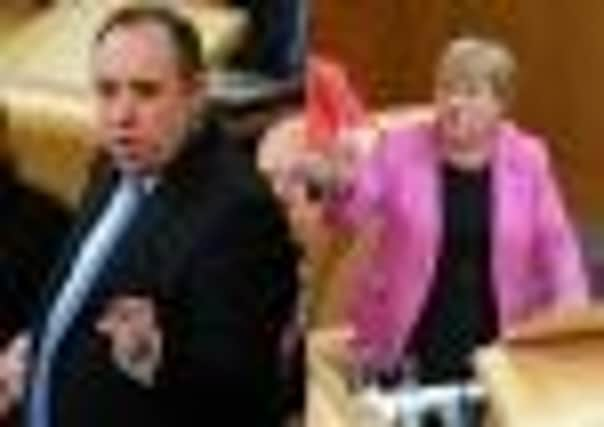Labour & SNP ‘must co-operate to win back voters’


Andrew Burns, who heads Edinburgh’s Labour-SNP coalition, has called on Alex Salmond and Johann Lamont to form an anti-Tory alliance similar to that agreed between the two parties in the capital.
Mr Burns’s plea comes as a report for Holyrood’s welfare reform committee, published today, shows that cut will hit those in poorer parts of Scotland the hardest.
Advertisement
Hide AdAdvertisement
Hide AdLast night, his intervention met with a cool response from Scotland’s two main political parties, which are at constant loggerheads over the independence referendum, with each blaming the other for a failure to unite to oppose the welfare reforms.
However, his plea for a greater unity on the centre-left to challenge the coaltion was given a warmer welcome by his SNP deputyin Edinburgh, Steve Cardownie, who said the two parties broadly agreed on social policies.
The call comes a year after the groups agreed to form Scotland’s only Labour-SNP administration to run the country’s second biggest council.
Writing in The Scotsman today, Mr Burns warns that the “tribal antagonism” between the two parties – which he says comes across as “near-hatred” – is alienating voters and hindering effective opposition towards coalition policies, such as the “bedroom tax”.
Citing the spectacle of “Johann Lamont and Alex Salmond, slog[ging] it out every Thursday at FMQs”, Mr Burns asks: “Are you really telling me that there are simply no issues on which our MSPs can co-operate for the next 18 months as we await the referendum?”
He adds: “Learning to put one’s ego aside and take a pragmatic approach to
make a much bigger impact together, than you would apart, is surely a prize worth striving for.”
Mr Burns insists Labour and the SNP agree on a “huge swathe of domestic issues” and says the Edinburgh pact could be a model for a wider spirit of co-operation.
Advertisement
Hide AdAdvertisement
Hide AdHe also says that a new consensus on the bedroom tax – which imposes a levy on welfare claimants living in under-occupied homes – and other issues could help politicians at Holyrood to win back the “trust and respect of the electorate”.
“Trust has broken down badly between the electorate and politicians at all levels of government, and I believe that this kind of unnecessary tribalism certainly does not help,” he writes.
“For me, we’ll never successfully reinvigorate our democracy if we can’t bring ourselves to acknowledge that there’s a problem to solve and to change the way we do things politically. Business as usual just cannot, sensibly be an option.
“It was doing things differently that enabled historically bitter enemies to create a Labour/Scottish National Party coalition in Edinburgh’s City Chambers after last May’s council elections.
“If we’re to stand any chance of rejuvenating our political culture at a Scottish level, and regaining the trust and respect of the electorate, we surely must not allow party interests to get in the way of good policies and a refreshed approach to doing business.”
Last night, Mr Burns’s remarks found an echo in his council coalition partner. Mr Cardownie said Labour and the Nationalists were “motivated by the same concerns” on issues such as poverty and welfare.
ALabour councillor before defecting in 2005, he has already agreed a “no eviction” policy with Mr Burns for council tenants affected by the bedroom tax.
He said Labour and the SNP in Edinburgh had agreed to “park the question of independence and unionism at the door of the City Chambers”.
Advertisement
Hide AdAdvertisement
Hide Ad“If it’s worked in Edinburgh, it can work anywhere. We’re both left-of-centre parties.”
At Westminster, Labour and the SNP both oppose the bedroom tax, with more than 90 per cent of Scottish MPs voting against it and other coalition welfare policies.
Scottish Labour has called on SNP ministers to find money to fund exemptions for the most vulnerable affected by the bedroom tax. However, the SNP says that Labour, which runs or is involved in running half of Scotland’s 32 councils, should pledge not to evict anybody on the basis of money they have lost from the levy.
Former first minister Henry McLeish has previously warned that the “intrinsic hatred” between the parties at Holyrood is threatening to undermine democracy in Scotland.
Labour and the SNP both issued statements that attacked each other’s stance on the bedroom tax, as well as suggesting their opponents had rejected calls for co-operation.
A Scottish Labour spokesman said: “Scottish Labour MSPs repeatedly offered to work with the SNP to find time to debate emergency legislation and to work with the SNP to find additional money to alleviate the impact of the bedroom tax on all vulnerable Scots. The SNP refused every offer.”
An SNP spokesman said: “Instead of using vulnerable people to play political games, the Labour Party would actually do well to follow the lead of their colleagues in Edinburgh, who are working with the SNP to defend people against this tax.”